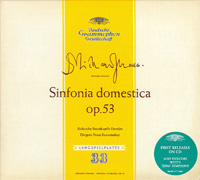 |
| April 1, 2006 Konwitschny Gems  Deutsche
Grammophon, in its mostly monophonic, entirely low-priced reissue/historical series
"Musik…Sprache der Welt" ("Music…the Universal Language"),
has brought out some treasured stuff old-time collectors had about given up hope of ever
seeing on CD: performances recorded monophonically in 1956 of Richard Strauss’s Symphonia
Domestica and Friedrich Witt’s Symphony in C Major, by the Saxon State Orchestra
(since renamed the Dresden State Orchestra) under the direction of Franz Konwitschny [DG
089 477 5483]. If you’re under 50, you may never have heard of this conductor; no
matter what your age, you may draw a blank on Friedrich Witt. But pay attention: this is
something special. Deutsche
Grammophon, in its mostly monophonic, entirely low-priced reissue/historical series
"Musik…Sprache der Welt" ("Music…the Universal Language"),
has brought out some treasured stuff old-time collectors had about given up hope of ever
seeing on CD: performances recorded monophonically in 1956 of Richard Strauss’s Symphonia
Domestica and Friedrich Witt’s Symphony in C Major, by the Saxon State Orchestra
(since renamed the Dresden State Orchestra) under the direction of Franz Konwitschny [DG
089 477 5483]. If you’re under 50, you may never have heard of this conductor; no
matter what your age, you may draw a blank on Friedrich Witt. But pay attention: this is
something special.
Those of us who were around in the 1950s remember Konwitschny as quite a presence. He never came to North America, but he appeared all over Europe and in Japan, conducted a memorable Ring at Covent Garden, and made quite a number of well received recordings, with major German orchestras and the Czech Philharmonic, that reached us over here on various labels. One of the earliest was a Urania LP of the overtures to Wagner’s first four operas (Die Feen; Das Liebesverbot; Die fliegende Holländer; Tannhäuser) with the Munich Opera Orchestra, a collector’s item to this day, despite some unsteadiness in the horns. Another was a Beethoven symphony cycle with the Leipzig Gewandhaus Orchestra for Philips. A German born in Moravia, Konwitschny (1901-1962) became East Germany’s preeminent conductor, in both the concert hall and the opera house. From 1949 until his death he was conductor of the Gewandhaus Orchestra, successor to the likes of Furtwängler, Nikisch and Bruno Walter, predecessor of Kurt Masur. During some of those dozen years he also headed Staatsopern in both Berlin and Dresden. He was a superb musician, relaxed, down-to-earth, absolutely eschewing the cultivation of any sort of mystique, but assured in his mission, and supremely competent. He was never less than dependable, frequently insightful and inspired in music of Beethoven, Bruckner, Wagner and Strauss. The big work here, the Symphonia Domestica, whose premiere Strauss himself conducted at Wanamaker’s department store in New York in 1904, depicts a day in the household of the composer, his wife, and their infant son. It was a slice of autobiography totally different from the earlier self-congratulatory Heldenleben, and it never became one of Strauss’s really popular works, but real Straussians -- Reiner, Szell, Kempe, Krauss -- loved it, and Konwitschny actually made it a specialty. It is good that we have one of his performances of it, and this one is simply terrific; the conductor’s through familiarity with this score, and his obvious affection for it, had his players at the top of their form, and even now this incandescent realization has the power to convert armies of listeners who may have written the piece off.
The point is that the Jena Symphony is too good to miss, and Konwitschny really did it proud. All the other recordings of this work issued here except the first one, by Werner Janssen and his Los Angeles-based orchestra on RCA Victor 78s (and subsequently on a Camden LP), have been lackluster, but Konwitschny brought to bear not only real belief in the work but the instincts, insights and all-round resourcefulness of a certifiable master of the Haydn/Beethoven repertoire. This is a work anyone with working ears will enjoy knowing, and it has never had stronger advocacy. Moreover, the sound, although 50-year-old mono, is very good mono, and DG’s splendid restoration shows just how good: surprisingly rich and well defined -- not only in the relatively lightly scored Witt symphony, but in conveying the power and contrasting colors of the Strauss in considerable detail and excellent balance. You will not have to "make allowances" to enjoy this to the full. ...Richard Freed
Ultra Audio is part of the SoundStage! Network. |
 But the smaller (or in any
event shorter) symphony by Witt (1770-1836) is even more of a treasure in
Konwitschny’s robust yet elegant realization. It is called the "Jena"
Symphony because it was discovered at the University of Jena in 1909. That manuscript had
Beethoven’s name on it, and for some 50 years it was regarded as possibly being an
early work by that composer. The first several recordings of it, in fact, were so labeled.
It was only in the late 1950s that the American Haydn authority H.C. Robbins Landon found
evidence of Witt’s authorship. This substantial Haydn-style symphony might pass for
Haydn’s own. Its opening movement is so clearly modeled after the corresponding
section of Haydn’s Symphony No.97 in the same key that some scholars have denounced
Witt as an out-and-out plagiarist. At the same time, though, it may be noted that the
theme of the first movement resembles one in the slow movement of Beethoven’s Op.18/1
String Quartet, and that of the slow movement seems to "pre-echo" the aria
"O rest in the Lord," composed by Mendelssohn for his oratorio Elijah ten
years after Witt’s death. At all points Witt’s handling of his material is
first-rate, and if he did set out to imitate Haydn he did pretty well at it.
But the smaller (or in any
event shorter) symphony by Witt (1770-1836) is even more of a treasure in
Konwitschny’s robust yet elegant realization. It is called the "Jena"
Symphony because it was discovered at the University of Jena in 1909. That manuscript had
Beethoven’s name on it, and for some 50 years it was regarded as possibly being an
early work by that composer. The first several recordings of it, in fact, were so labeled.
It was only in the late 1950s that the American Haydn authority H.C. Robbins Landon found
evidence of Witt’s authorship. This substantial Haydn-style symphony might pass for
Haydn’s own. Its opening movement is so clearly modeled after the corresponding
section of Haydn’s Symphony No.97 in the same key that some scholars have denounced
Witt as an out-and-out plagiarist. At the same time, though, it may be noted that the
theme of the first movement resembles one in the slow movement of Beethoven’s Op.18/1
String Quartet, and that of the slow movement seems to "pre-echo" the aria
"O rest in the Lord," composed by Mendelssohn for his oratorio Elijah ten
years after Witt’s death. At all points Witt’s handling of his material is
first-rate, and if he did set out to imitate Haydn he did pretty well at it.